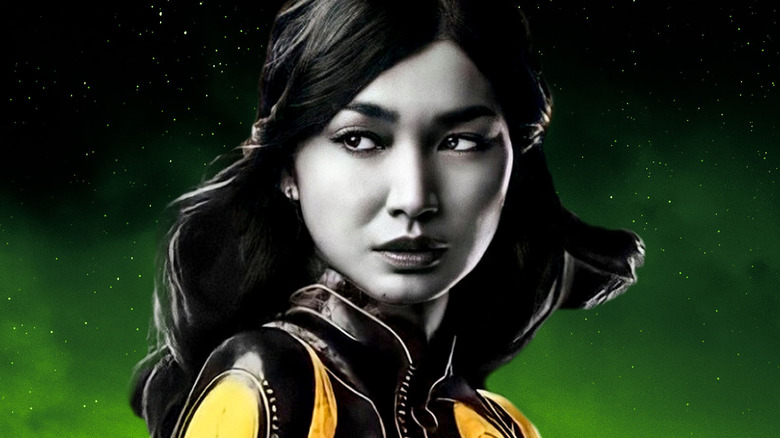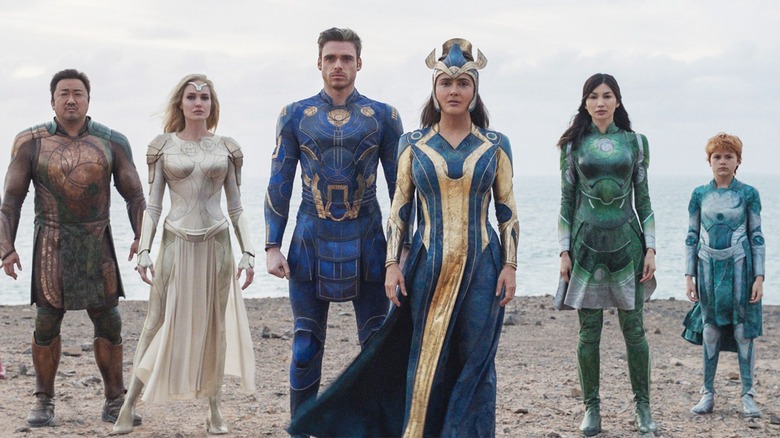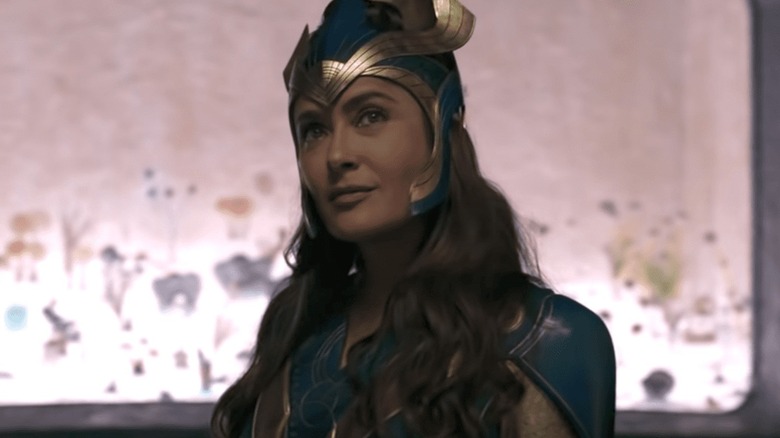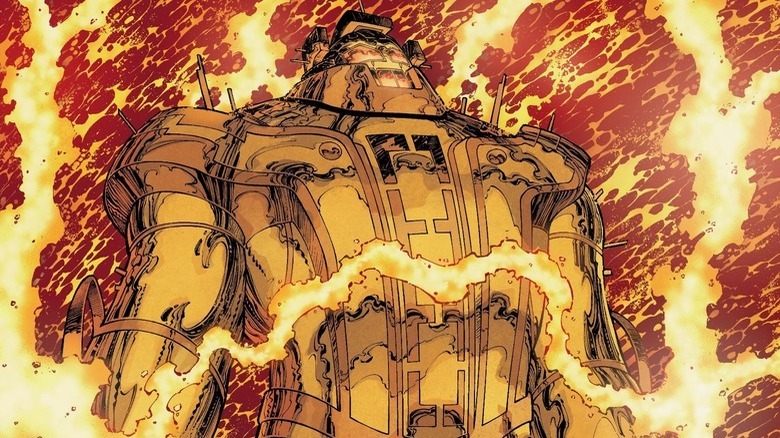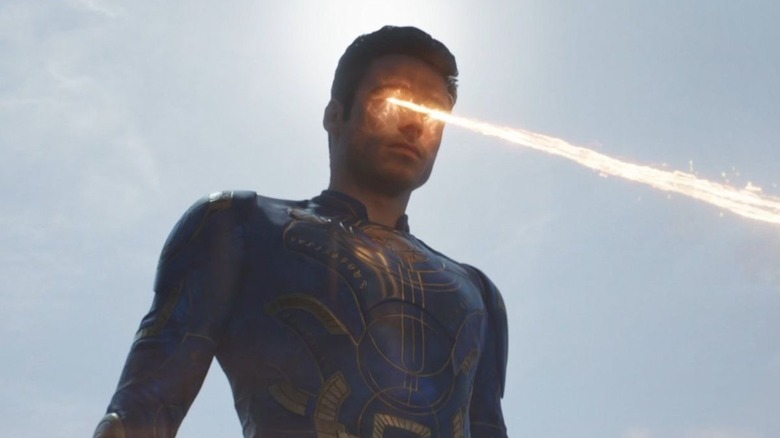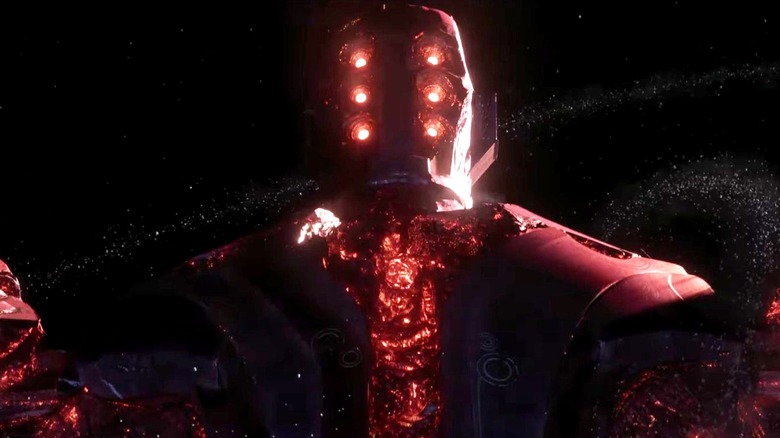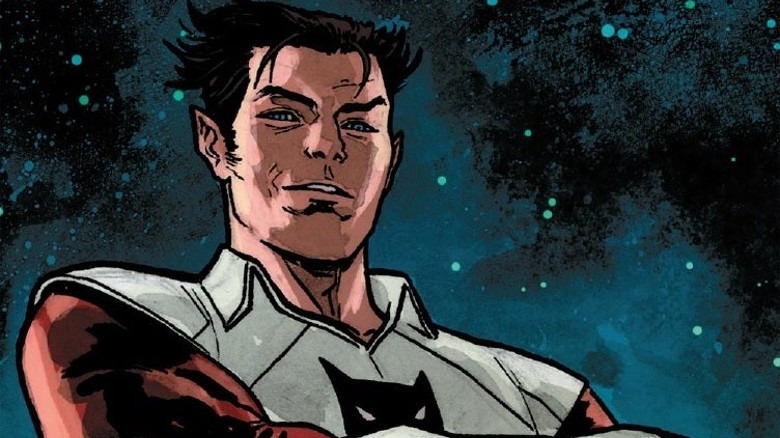Eternals Ending Explained: The Truth About Celestials Emerges
Earth has a new team of protectors — in fact, they've been here all along. Chloé Zhao's "Eternals" introduces a family of superheroes who were sent to Earth 7000 years ago to protect humans from rampaging creatures called Deviants. When the last of the Deviants were seemingly defeated in 1521 AD, the Eternals went their separate ways and tried their best to build lives for themselves as they waited for their next mission. However, the ending of "Eternals" forces them to choose between the will of their Celestial deity, Arishem, and the lives of everyone on Earth.
The Eternals are: Ajak (Salma Hayek), the Prime Eternal and leader of the group; Ikaris (Richard Madden), who can fire energy beams from his eyes; Sersi (Gemma Chan) who can manipulate matter and turn stone to dust (and back again); Phastos (Brian Tyree Henry), who can create complex machines with a wave of his hands; Druig (Barry Keoghan), who can control people's minds; Kingo (Kumail Nanjiani), who has finger guns; Makkari (Lauren Ridloff), a speedster; Sprite (Lia McHugh), a master illusionist stuck in a child's body; Gilgamesh (Don Lee), possessor of mighty strength; and Thena (Angelina Jolie), who can summon and wield energy weapons.
The death of one of their number brings the Eternals back together, but the truth about their purpose on Earth threatens to tear the rest of them apart. Here's our breakdown of the ending of "Eternals" — obviously there are plenty of spoilers from here on!
The Truth About Celestials, Eternals, and Deviants
After Ajak's death, Sersi is surprised to find that she was chosen as the next Prime Eternal — the leader of the mission, and the only Eternal capable of communicating directly with Arishem. As the Prime Eternal, Sersi finds herself burdened with a horrible truth: She and the other Eternals weren't put on Earth to protect humans for their own benefit, but to protect them like cattle, help their technologies to advance, and exponentially grow the population of the planet and its associated cosmic energy.
Why? The answer lies in how new Celestials are born. These are the most powerful known entities in the Marvel Cinematic Universe. The sheer scale of them was first hinted at in "Guardians of the Galaxy," when the ragtag team of space misfits visited the mining colony of Knowhere — built in the empty skull of a dead Celestial. The brain, bone, and other matter from the Celestial's head generates enough wealth to support a small economy on Knowhere, and in a flashback courtesy of the Collector, a Celestial was shown wielding the Power Stone to wipe out an entire planet.
The only way that such a being can be created, Arishem tells Sersi, is by planting the seed for a Celestial at the core of a planet. As intelligent life evolves and grows on the planet, like humans did, the fetal Celestial draws on the energy being created by the surface-dwelling inhabitants and uses it to grow ... and grow ... and grow. Then one day the Celestial is "born," and that does not go well for the planet it was growing in.
Arishem planted the seeds for new Celestials across the universe, and then created the Deviants to wipe out existing predators on the planet so that softer, weaker, species with larger brains could become the apex predator, advancing civilization and unknowingly feeding the Celestial beneath their feet. However, the Deviants were flawed and broke free from Arishem's control, attacking intelligent life and stymieing the population growth of sentient beings.
The Eternals, like the Deviants, are effectively very fancy robots; they were created and programmed by Arishem to go to planets and clear out the Deviants so that the "pregnancy" can continue unimpeded. The planet they were programmed to believe they came from, Olympia, doesn't actually exist. Though the Eternals think that Earth is their first assignment, they're actually millions of years old and have already carried out many other missions on thousands of other planets.
Why Ikaris Killed Ajak
Throughout "Eternals," the team express incredulity that Ajak chose Sersi as her successor rather than Ikaris, who is generally perceived as the strongest of the group due to his ability to fly and shoot laser beams from his eyes. Sersi also lacks confidence in her own abilities, and tries to defer to Ikaris when it comes to making tough decisions. Ikaris, however, seems oddly conflicted and resists the offer of leadership.
It's eventually revealed that Ikaris was indeed Ajak's second-in-command, and is the only other Eternal whom she trusted with the truth about what they were doing on Earth. However, Ajak began to have doubts about following Arishem's orders in the wake of the events of "Avengers: Endgame." Witnessing Earth's heroes restoring half of all life in the universe with a snap of the Infinity Gauntlet led Ajak to believe that Earth is a vital part of the galaxy and deserves to be spared from the fate of all the other planets the Eternals were sent to.
Ikaris, on the other hand, was steadfast in his loyalty to Arishem and saw Ajak as a threat to the mission. To prevent her from sabotaging the emergence of Tiamut, Earth's Celestial, Ikaris threw Ajak to a pack of Deviants and let them kill her. The decision caused him great anguish, and when he was called upon to do the same to Sersi, Ikaris found himself unable to murder the woman he loves.
The Emergence and Death(?) of Tiamut
Tiamut isn't your typical Marvel villain. Like the Infinity Stones, the Celestials aren't necessarily good or bad, but are an essential force within the universe that are responsible for both creating and destroying life. They're not superheroes or supervillains, but gods, and as such they have a big-picture perspective that doesn't necessarily include a lot of sympathy for mortal beings. Since Celestials experience life in eons rather than years, it's pretty immaterial to them whether a single life in the universe lives to be 100 years old, or dies before their first birthday.
With that in mind, Tiamut's emergence from Earth isn't an act of malice any more than a baby being born is an act of malice towards its mother. Moreover, stopping Tiamut from emerging means that all of the worlds and lives that Tiamut would have gone on to create in the universe will now never exist. It's far from a morally clean decision, and on top of the internal conflict she feels over the decision, Sersi also has to contend with resistance from Ikaris and Sprite (who chooses to join Ikaris because she's secretly been in love with him for thousands of years.)
At the beginning of "Eternals," Sersi says that her powers can't be used to affect sentient beings — but this is called into question when she rather impressively turns a Deviant into a tree. It seems that becoming the Prime Eternal gave her a bit of a power boost, and Phastos figures out a way to pool the Eternals' collective power into Sersi by making adjustments to the sphere that marks her as the Prime Eternal. This Uni-Mind (as Phastos dubs it) is effectively the equivalent of all the Power Rangers teaming up to become the Megazord, and it allows Sersi to turn the planet-sized Tiamut to stone.
It's said that this kills Tiamut, but whether or not that's actually the case remains to be seen; after all, Celestials are extremely powerful, and Tiamut gestated in the molten core of a planet so he's not exactly a stranger to adversity. It's even possible that Tiamut witnessed what the Eternals were doing and decided to give Sersi's powers a boost, in order to spare Earth from destruction a little longer. Celestials work in mysterious ways.
Is Ikaris Really Dead?
"Eternals" has a surprisingly high body count. Not only is Ajak killed off early, she's later joined by Gilgamesh. After finding himself unable to kill Sersi, Ikaris flies away and goes to therapy. Just kidding! He deals with his emotions by flying directly into the sun, in an ode to the Greek myth that Sprite invented about him.
Unlike the myth, Ikaris doesn't fall into the ocean when his wings melt; instead, he's last seen being consumed by the heat of the sun. Ordinarily that would be game over, but ordinary people can't fly through space, so it's safe to say that Ikaris' death leaves an opening for his eventual return and a possible redemption arc. If anything, Ikaris could end up absorbing the sun's cosmic energy and becoming even more powerful than before.
Where Has Arishem Taken the Eternals?
Arishem is not happy about the Celestials failing their mission and leaving poor Tiamut's head and fingers sticking awkwardly out of the ocean. Just as Sersi is starting to relax back into her life with her boyfriend, Dane Whitman (Kit Harington), Arishem's head looms over Earth and he grabs Sersi, Kingo, and Phastos — who, along with a now-human Sprite, remained behind on Earth while Makkari, Thena, and Druig left to explore the universe.
After scolding his wayward children, Arishem declares his intent to comb through the 7000 years of the Eternals' memories on Earth and use them to make a judgment of whether the planet will be allowed to survive, or whether it should be destroyed. This is in keeping with the depiction of Arishem in Marvel Comics, where he's known as Arishem the Judge. While the Eternals no doubt have lots of fond memories of their time on Earth, there have also been a lot of wars and other atrocities that don't make humans look very good. Will the defeat of Thanos and the restoration of countless trillions of lives across the universe be enough to tip the balance back in our favor?
Mid-Credits Scene: Pip the Troll & Eros
Hope isn't lost for Sersi, Phastos, and Druig. Three of the other Eternals left Earth in their ship, the Domo, and are spared from being abducted by Arishem. While planning their next move, Thena, Druig, and Phastos are interrupted by the arrival of two strangers on their ship: Pip the Troll (Patton Oswalt) and the brother of Thanos — Eros aka Skyfox (played by the devastatingly dashing Harry Styles)
Fortunately Starfox is both less purple and less bent on genocide than his late brother; in fact, he's here to help the Eternals in their quest. Eros and Thanos have never exactly been close in Marvel Comics canon, on account of Eros being their mother's preferred son and Thanos later murdering their mother and destroying their home planet (you know, the usual sibling stuff). If you're wondering why Eros is human-sized and human-colored, it's because Thanos' purple skin and gigantic frame are the result of a condition called Deviant Syndrome that corrupted his DNA with Deviant genes.
In the comics, Starfox has a few generic superpowers like flight, super-strength, and regeneration. What's really special about him, however, is his telepathic ability to stimulate people's brains and cause them to feel pleasure. Leave it to the first MCU movie with a sex scene to lay the groundwork for even more sexiness in the future.
Post-Credits Scene: The Black Knight Rises
Veterans of MCU movies know better than to get out of their seats just because the credits are rolling. In the post-credits scene for "Eternals," Dane decides to rise to the occasion and rescue his captured princess with the help of his old family sword. However, said sword has a distinctly ominous look to it and the inscription on its case — "Mors Mihi Lucrum" ("Death is my reward") — implies that wielding it comes at a price.
Before he can touch the blade, Dane is interrupted by a voice asking him, "Are you sure you're ready for that?" That voice is none other than Mahershala Ali, making his debut in the MCU as Blade. Ali is set to appear in his own upcoming solo movie, so his appearance in "Eternals" suggests that Kit Harington could be joining the cast of "Blade" — with the Black Knight's Ebony Blade in tow.
Dane actually begins to tell Sersi about the family secrets he's uncovered, before she's rudely kidnapped by Arishem. In Marvel Comics, Dane inherits the mantle of Black Knight and becomes the latest in his family line to wield the Ebony Blade, a mystical sword carved from a meteorite by the wizard Merlin and Dane's ancestor, Prince Percy of Scandia.
"Eternals" is in theaters now.
